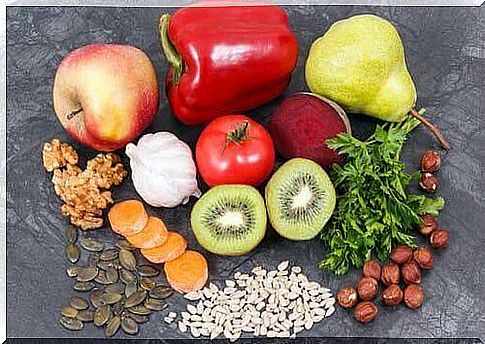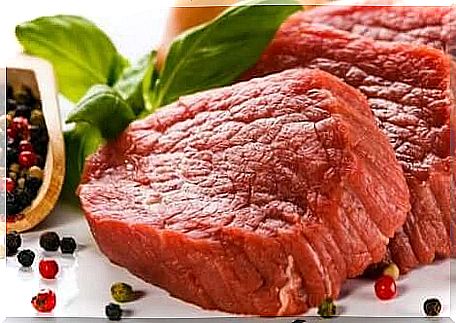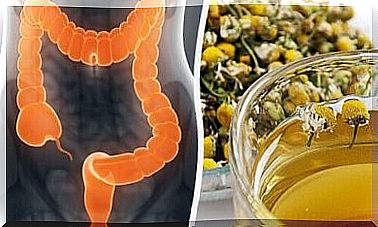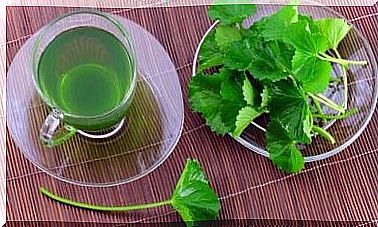Foods You Can’t Eat With High Uric Acid Content

A high uric acid level or hyperuricemia is usually associated with people who enjoy excesses, both in food and drink. While we know it depends on several factors, diet change is important if you have high uric acid levels.
Hyperuricaemia or a high uric acid level
Uric acid is a compound made up of carbon, nitrogen, oxygen and hydrogen that is created when your body breaks down purines. Thus, purines are formed naturally in the body and are also found in some foods.
Uric acid does not cause health problems if you have normal levels because it is excreted by the kidneys. However, for various reasons, your uric acid levels can sometimes rise above acceptable levels.
If you have a high uric acid level, gout is one of the most dreaded problems. However, the negative consequences of hyperuricemia can be even more serious. It is linked to a higher risk of, among other things:
- kidney problems
- cardiovascular problems
- chronic joint damage
Foods with a high uric acid content
You need to correct high uric acid levels to prevent long-term health problems and loss of quality of life. Changing some dietary habits can be very helpful in this regard.
If you suffer from this health problem, it is better to avoid certain foods. Keep in mind, though, that we’re not talking about banned foods, just foods that you should limit.
Purine-rich foods

Purines are components that are naturally formed in the body. When they are broken down, uric acid is formed. Therefore, controlling your intake of foods high in purine can help reduce the amount of uric acid in your blood.
This is especially true during an attack of gout. Foods high in purine include:
- Liver, kidney, thymus and other organ meats.
- Red meat (beef, pork and lamb).
- Oily fish and seafood such as sardines, anchovies, tuna, shrimp, shrimp and crab. You should not completely avoid them all or you will miss out on their benefits. It is best to eat a moderate portion every now and then.
- sausages.
- Fermented cheeses.
Also certain vegetables such as asparagus, peas, spinach and tomato. A sensible option is to moderate your consumption of these types of vegetables to once or twice a week.
Fatty foods
It is more difficult to eliminate urates if you eat a lot of fat. For this reason, you need to control the fat in your diet if you have high purine levels.
The best option, as almost always, is to use extra virgin olive oil. You can use it cold to spice up your dishes. You can use regular olive oil for baking.
It is better to completely eliminate ultra-processed foods that may contain trans or hydrogenated fats and reduce your intake of saturated fat.
Fructose and sugary drinks
Fructose is the only carbohydrate shown to have a direct relationship with metabolizing uric acid. In this case, we are talking about soda, fruit juice and other sweetened drinks.
The risk of gout is twice as high in people who drink two or more glasses of sugary drinks per day, compared to people who drink less than one glass per month.
However, we don’t know the exact reason for this increase in uric acid. It could be due to ingredients in the drinks other than fructose, or to other unhealthy habits. That needs to be further investigated.
Alcohol

In the case of alcoholic beverages, there is no doubt. This is because consuming a lot of alcohol in a short time increases the lactic acid concentration in the body. This makes it difficult for the kidneys to remove the uric acid.
- If you drink alcohol very regularly, the problem is caused by high purine levels.
- The risk of developing gout is twice as high in men who drink 50 grams or more of alcohol per day, compared to men who do not drink alcohol.
- In both men and women, alcohol consumption is associated with higher rates of uricemia and gout. In fact, the risk is even greater in women.
Dietary measures to keep in mind with high uric acid levels
When we talk about hyperuricemia, we’re not just talking about foods that you shouldn’t eat or eat too often. There are other nutritional measures and related aspects you can take to improve your situation. We list a few examples below:
- It is not good to have a weight higher than what is considered healthy. If you are overweight, you should take measures and try to lose weight gradually.
- You should not fast or extremely restrict your calorie intake as this can also lead to high uric acid levels.
- Stay well hydrated. You should drink about 2 liters (8 cups) of water per day.
All of these steps should guide your specific medical treatment prepared by a medical professional to avoid high uric acid levels as much as possible.
Conclusion
You should limit your consumption of red meat, oily fish, sugary drinks and alcohol if you suffer from hyperuricemia. Eating in moderation, drinking plenty of water and eating a diet full of fresh fruits and vegetables, whole grains, skim milk and yogurt will help to fight high uric acid levels.









